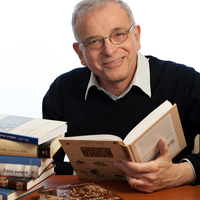moshe rosman
Bar-Ilan University, Jewish History, Faculty Member
Categorically Jewish, Distinctly Polish: The Museum of the History of Polish Jews and the New Polish-Jewish Metahistory
Research Interests:
Research Interests:
Book Review
Research Interests:
ABSTRACT
Research Interests:
Research Interests:
Research Interests:
ABSTRACT
Research Interests:
ABSTRACT
This book has been brought to publication with the generous assistance of Mr. Moses Deitcher and the Bloomfield family, of Montreal, through the Eldee Foundation. © 1997 The Johns Hopkins University Press All rights reserved. Published... more
This book has been brought to publication with the generous assistance of Mr. Moses Deitcher and the Bloomfield family, of Montreal, through the Eldee Foundation. © 1997 The Johns Hopkins University Press All rights reserved. Published 1997 Printed in the United States of ...
Research Interests:
ABSTRACT
Research Interests:
... The lords' Jews: Magnate-Jewish relations in the Polish-Lithuanian Commonwealth during the eighteenth century. Post a Comment. CONTRIBUTORS: Author: Rosman, MJ. PUBLISHER: Harvard University Press for the Center ...
Research Interests:
Research Interests:
Research Interests:
Analysis of the state of knowledge about Jewish women in the Polish-Lithuanian Commonwealth. Suggestions for research categories and directions. Critique of existing scholarship.
Research Interests:
Analysis of cases where the Polish-Jewish Council of Four Lands [Vaad Arba Aratzot] intervened outside of Poland
Research Interests:
Analysis of how Hebrew sources relating to the Baal Shem Tov should be utilized. Argues that sources should be seen as "usable" rather than "reliable"
Research Interests:
This paper argues that Hasidism is a modern phenomenon and a successful modern Jewish movement.
Research Interests:
An analysis 60 years of Israeli scholarship on Hasidism
This Hebrew paper presents the text of Leah Horowitz's Introduction to her Tekhino Imohos. It includes the Hebrew text, textual commentary and discussion of the sections of the work. Horowitz asserted: 1) Women could claim the crown of... more
This Hebrew paper presents the text of Leah Horowitz's Introduction to her Tekhino Imohos. It includes the Hebrew text, textual commentary and discussion of the sections of the work. Horowitz asserted: 1) Women could claim the crown of Torah and write Torah-focused and liturgical works; 2) Women need prayers to recite in the synagogue so they will not be tempted into idle talk; 3) Women should attend the synagogue daily and at least contribute their tears to the service; 4) Women have fully 411 commandments to fulfill, in actuality only 14 fewer than men; 5) It is a woman's job to ensure that her husband studies Torah and does not slack off.
Research Interests:
A Review of my last book: CATEGORICALLY JEWISH, DISTINCTLY POLISH
